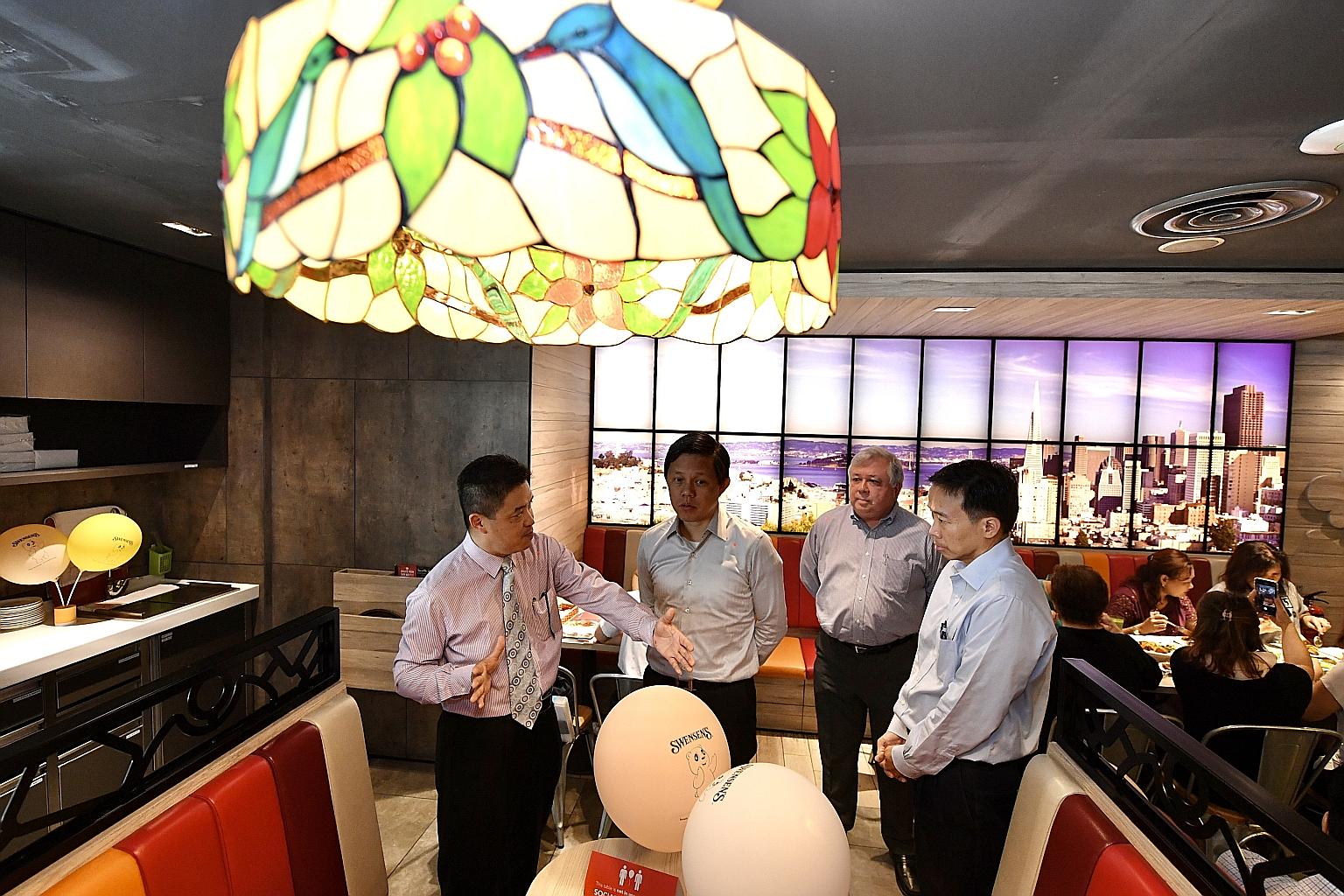Coronavirus: It takes collective effort to boost food supply resilience, says Chan Chun Sing
Sign up now: Get ST's newsletters delivered to your inbox

Trade and Industry Minister Chan Chun Sing visiting a Swensen's outlet at Bugis Junction yesterday with (from left) Mr Benny Ng, general manager of operations at ABR Holdings, the parent company of Swensen's; Mr Keith Chua, executive chairman of ABR Holdings; and Mr Png Cheong Boon, chief executive of Enterprise Singapore.
ST PHOTO: DESMOND FOO
Strengthening the resilience of Singapore's food supply takes collective effort as a society, said Trade and Industry Minister Chan Chun Sing yesterday.
Besides the work of diversifying food supplies in peacetime, it is also important to make sure that Singapore businesses and consumers are open to alternatives and substitutes, he said.
Mr Chan noted: "If we are unable to adapt to alternatives and substitutes, then we could be held ransom by those sources that provide us with the original food supply.
"If we have some degree of flexibility and adaptability, it will strengthen our ability to find different sources."
Using eggs as an example, Mr Chan pointed out that liquid eggs, which can be stored for longer than fresh eggs, can be alternatives if more Singaporeans were willing to use them.
And while Singapore tries to secure fresh supplies from as many countries and sources as pos-sible, it also needs to be prepared to use alternatives like frozen or canned food to tide over times when there is a temporary disruption, he noted.
Mr Chan was speaking to the media after visiting a Swensen's outlet at Bugis Junction, where he met the senior management of Swensen's parent company, ABR Holdings.
His comments come as countries around the world tighten measures to control the spread of Covid-19, with some choosing to suspend exports of essential food items.
Vietnam, the world's third-largest exporter of rice, announced on March 25 that it was suspending new rice exports to ensure its food safety.
Mr Chan said that while it is in everyone's interest to maintain the flow of goods amid the current outbreak, there are domestic challenges which may get in the way of trade.
"When some places lock down and do not fully consider the implications of the lockdown on certain factories, they could find themselves short of many components in their product chain," he said, noting that this could affect sectors like food production and manufacturing.
Mr Chan added that maintaining connectivity is of key importance to Singapore, given its position as an aviation and maritime hub.
"It is not just about Singapore connecting with the world for our own supplies, but Singapore as a regional hub also provides connectivity and services for the rest of the region and the rest of the world.
"From Singapore's perspective, we are very determined to make sure that we continue to preserve our (aviation and maritime) hub status," he said.
Commenting on Singapore's Resilience Budget, which was unveiled by Deputy Prime Minister and Finance Minister Heng Swee Keat on March 26, Mr Chan said it was aimed at maintaining capacity, which includes jobs, enhancing capabilities, strengthening connectivity, and confidence.
"The size of the package and the way the package has been designed must give people confidence that we have the depth of resources to meet the new challenges that may still be emerging," he said.
"It must also give people confidence that we have a Government that knows exactly how to tackle the issues in a surgical way."
Singapore's total fiscal stimulus to boost its economy amid the coronavirus outbreak is around $55 billion, and is among the highest in the world in terms of dollars per capita.
The Resilience Budget is an indication of the Government's focus in preserving jobs and businesses, Mr Chan stressed.
He said that talk about a third package is premature for now, and Singapore should focus on best utilising the measures rolled out in February's Budget and last week's second package.
"But what we can be assured of is that should we need to do more, we have the depth of resources to be able to do more, and that should give Singaporeans and international businesses confidence in us for the long term."


